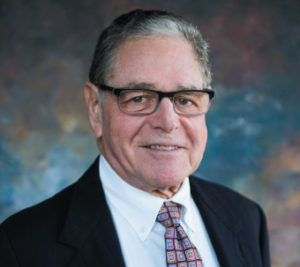Owner and Director, Clayman & Associates, PLLC

By Samantha Cart
David Clayman, Ph.D., has been serving the citizens of West Virginia as a clinical, medical and forensic psychologist and advocate for 45 years.
A native of Massachusetts, Clayman earned his bachelor’s degree in psychology from Trinity College in Hartford, CT, and his Ph.D. in clinical psychology from the University of Vermont. His interest in behavioral medicine led him to the Mountain State in 1974 when he joined the faculty of West Virginia University (WVU) School of Medicine’s Department of Behavioral Medicine and Psychiatry. While his job was to provide outpatient psychotherapy and train medical students, much of his time was spent on medical floors consulting on patients experiencing emotional and behavioral issues associated with their illnesses and working closely with physicians and nurses.
Determined to show an integrated approach to mental health and medical disease management and demonstrate his usefulness in managing difficult patients, Clayman immersed himself in medical psychology activities both in the hospital and the community. Since then, he has been a passionate advocate for achieving the highest level of integrated health in West Virginia.
In 1981, Clayman left academia to form Process Strategies Institute with clinical psychologist Steven Dreyer, Ph.D. The practice provided outpatient mental health services using nonmedical psychological techniques. The team quickly grew to include more than 25 therapists working to destigmatize those seeking treatment for mental health issues.
As Clayman continued to push boundaries, his expert skill set was sought by a variety of businesses and agencies. In 1984, a request from Judge Andrew MacQueen for a psychological assessment changed the course of Clayman’s career.
“The judge was concerned about a case involving a Vietnam veteran who acted criminally but did not appear to have criminal intent,” Clayman recalls. “This prompted my first formal engagement with the criminal court system.”
From there, court referrals grew steadily. To date, Clayman has been involved in providing forensic psychological services in approximately 5,000 civil and criminal court cases as a qualified state and federal expert. He served as a medical expert for the Social Security Administration’s Office of Hearing and Appeals for 15 years, and in 2006, Governor Joe Manchin appointed him to serve on the Sexually Violent Predator Management Task Force and the Eyewitness Identification Task Force. He is one of two psychologists who has served as an advisor to the Office of Behavioral Health Services and for the West Virginia Department of Health & Human Resources (DHHR), and for more than 10 years he served as the clinical director for the DHHR’s Forensic Evaluation Unit located at South Central Regional Jail to provide secondary assessments for the courts. He has also worked with what is now the West Virginia Division of Corrections and Rehabilitation since 1995 to provide mental health services within the adult and juvenile prison systems. Today, he works with the West Virginia State Police and other law enforcement agencies and first responders offering pre-employment evaluations and assessments after officers have been exposed to stressful situations.
Early in his career, Clayman spent time training health care professionals on end-of-life care and stress management, and this work inspired him to advocate for more humane terminal care. As a result, he helped develop the guidelines for Medicare reimbursement that would later become the criteria for HospiceCare, where he served as the first president.
“The initial mandate evolved into our volunteer group delivering home based care when requested,” he says. “During my tenure as founding president, the organization grew and began offering training to community volunteers to help provide care.”
Today, Clayman focuses on forensic psychology within his practice, Clayman & Associates, PLLC, which specializes in conducting psychological assessments of individuals involved in the legal system, business-related issues and law enforcement. While he initially only saw himself working in West Virginia for a few years, his decision to stay has changed his life and the lives of countless others.
“Wherever I travel, I make sure others know I am from West Virginia and seek to educate them about the wonders of this state in spite of the many challenges we face,” he says. “There is no other place where I would have been able to excel and contribute on a statewide level as I have here.”
HospiceCare
With the goal of using compassionate care to enhance the lives of individuals living with life-limiting illnesses and support their families, HospiceCare offers hospice and palliative care services and grief and loss programs to West Virginia families.
Founded in 1979 by volunteers who served patients in their homes in Charleston, HospiceCare is now celebrating its 40th anniversary. The organization has grown to serve more than 3,000 patients and their families in 16 West Virginia counties: Boone, Braxton, Clay, Fayette, Greenbrier, Jackson, Kanawha, Lincoln, Mason, Monroe, Nicholas, Pocahontas, Putnam, Roane, Summers and Webster.
HospiceCare services include comprehensive pain and symptom management; skilled nurses available around the clock; certified nursing assistants who provide bathing, dressing and personal care for patients; support for family caregivers; spiritual and emotional support from chaplains and counselors; and volunteers who can run errands and help with household chores.
While Medicare, Medicaid and most private insurance companies cover hospice services, it is the philosophy of the organization that any person who meets the admission criteria will be treated, regardless of their ability to pay. Community donations and fundraisers help fill the funding gaps.
One of many hospice and palliative care agencies around the state that make up the Hospice Council of West Virginia, HospiceCare is part of the network that serves the nearly 1.5 million Medicare beneficiaries who receive this type of care in the U.S. every year, according to the National Hospice and Palliative Care Organization.








